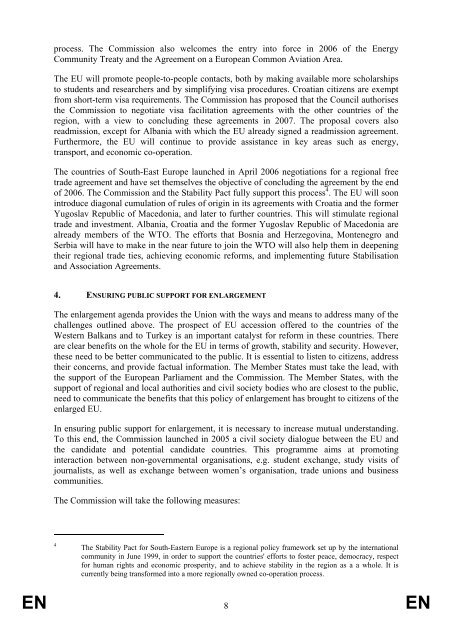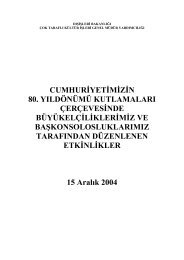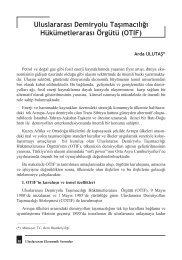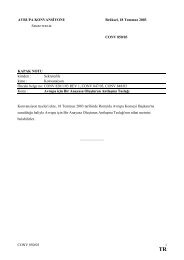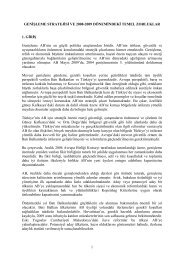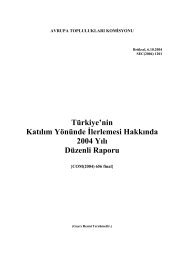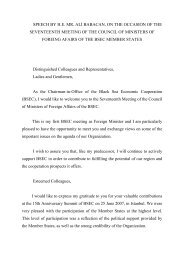Enlargement Strategy and Main Challenges 2006 - 2007
Enlargement Strategy and Main Challenges 2006 - 2007
Enlargement Strategy and Main Challenges 2006 - 2007
Create successful ePaper yourself
Turn your PDF publications into a flip-book with our unique Google optimized e-Paper software.
process. The Commission also welcomes the entry into force in <strong>2006</strong> of the Energy<br />
Community Treaty <strong>and</strong> the Agreement on a European Common Aviation Area.<br />
The EU will promote people-to-people contacts, both by making available more scholarships<br />
to students <strong>and</strong> researchers <strong>and</strong> by simplifying visa procedures. Croatian citizens are exempt<br />
from short-term visa requirements. The Commission has proposed that the Council authorises<br />
the Commission to negotiate visa facilitation agreements with the other countries of the<br />
region, with a view to concluding these agreements in <strong>2007</strong>. The proposal covers also<br />
readmission, except for Albania with which the EU already signed a readmission agreement.<br />
Furthermore, the EU will continue to provide assistance in key areas such as energy,<br />
transport, <strong>and</strong> economic co-operation.<br />
The countries of South-East Europe launched in April <strong>2006</strong> negotiations for a regional free<br />
trade agreement <strong>and</strong> have set themselves the objective of concluding the agreement by the end<br />
of <strong>2006</strong>. The Commission <strong>and</strong> the Stability Pact fully support this process 4 . The EU will soon<br />
introduce diagonal cumulation of rules of origin in its agreements with Croatia <strong>and</strong> the former<br />
Yugoslav Republic of Macedonia, <strong>and</strong> later to further countries. This will stimulate regional<br />
trade <strong>and</strong> investment. Albania, Croatia <strong>and</strong> the former Yugoslav Republic of Macedonia are<br />
already members of the WTO. The efforts that Bosnia <strong>and</strong> Herzegovina, Montenegro <strong>and</strong><br />
Serbia will have to make in the near future to join the WTO will also help them in deepening<br />
their regional trade ties, achieving economic reforms, <strong>and</strong> implementing future Stabilisation<br />
<strong>and</strong> Association Agreements.<br />
4. ENSURING PUBLIC SUPPORT FOR ENLARGEMENT<br />
The enlargement agenda provides the Union with the ways <strong>and</strong> means to address many of the<br />
challenges outlined above. The prospect of EU accession offered to the countries of the<br />
Western Balkans <strong>and</strong> to Turkey is an important catalyst for reform in these countries. There<br />
are clear benefits on the whole for the EU in terms of growth, stability <strong>and</strong> security. However,<br />
these need to be better communicated to the public. It is essential to listen to citizens, address<br />
their concerns, <strong>and</strong> provide factual information. The Member States must take the lead, with<br />
the support of the European Parliament <strong>and</strong> the Commission. The Member States, with the<br />
support of regional <strong>and</strong> local authorities <strong>and</strong> civil society bodies who are closest to the public,<br />
need to communicate the benefits that this policy of enlargement has brought to citizens of the<br />
enlarged EU.<br />
In ensuring public support for enlargement, it is necessary to increase mutual underst<strong>and</strong>ing.<br />
To this end, the Commission launched in 2005 a civil society dialogue between the EU <strong>and</strong><br />
the c<strong>and</strong>idate <strong>and</strong> potential c<strong>and</strong>idate countries. This programme aims at promoting<br />
interaction between non-governmental organisations, e.g. student exchange, study visits of<br />
journalists, as well as exchange between women’s organisation, trade unions <strong>and</strong> business<br />
communities.<br />
The Commission will take the following measures:<br />
4 The Stability Pact for South-Eastern Europe is a regional policy framework set up by the international<br />
community in June 1999, in order to support the countries' efforts to foster peace, democracy, respect<br />
for human rights <strong>and</strong> economic prosperity, <strong>and</strong> to achieve stability in the region as a a whole. It is<br />
currently being transformed into a more regionally owned co-operation process.<br />
EN 8 EN


